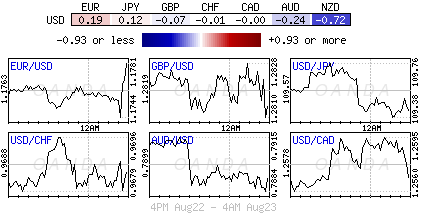Wednesday August 23: Five things the markets are talking about
The EUR (€1.1781) is the standout currency in another low volume trading session, supported by better than expected flash manufacturing and service PMI’s (see below) that continues to encourage investor confidence in the region’s growth.
Elsewhere, comments from President Trump at a rally in Arizona yesterday evening again have provoked another bout of investor caution with gold and yen benefitting.
The President said he “might terminate” the NAFTA trade treaty with Mexico and Canada after three-way talks failed to bridge deep differences and he would build a border wall with Mexico even if he has to shut down the U.S government to secure enough funding.
Geopolitical events continue to hover in the background. Investors are also keeping an eye on tensions between the U.S and North Korea, after the U.S and South Korea began joint military exercises on Monday.
oil prices are under pressure after U.S gasoline inventories rose.
1. Global stocks mixed results
In Japan, the Nikkei share average posted modest gains overnight (+0.3%), snapping a five session losing that marked its longest losing streak in 12-months. Presidents Trumps overnight comments pared some of those gains. The broader TOPIX rallied +0.3%, but turnover remains subdued, with more than -10% below the recent average.
In South Korea, the KOSPI added +0.1%, while down-under, Australia’s S&P/ASX 200 Index declined -0.2%.
In Hong Kong, trading was halted on Wednesday as a strong typhoon bared down on the financial centre and other parts of southern China.
In China, the main stock indexes ended little changed overnight, with profit taking in steel firms offsetting a rise in financials ahead of earnings reports. The CSI300 Index rose +0.1%, while the Shanghai Composite fell -0.1%.
In Europe, Indices trade lower across the board tracking U.S futures, despite stronger than expected Manufacturing PMI readings out of Europe.
U.S stocks are set to open in the red (-0.2%).
Indices: Stoxx600 -0.3% at 374.8, FTSE +0.1% at 7388, DAX -0.1% at 12219, CAC-40 flat at 5133, IBEX-35 -0.1% at 10397, FTSE MIB -0.1% at 21698, SMI -0.3% at 8941, S&P 500 Futures -0.2%
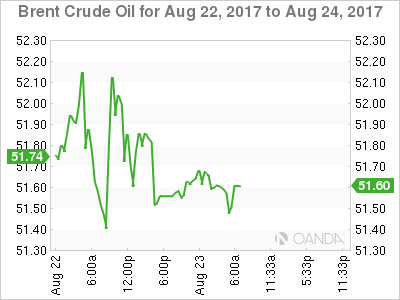
2. Oil prices fall on concerns of oversupply, gold higher
Ahead of the U.S open, oil prices trade under pressure, weighed down by concerns of oversupply as Libyan output improves and as U.S gasoline inventories rise.
Brent crude futures are at +$51.64 per barrel at 0721 GMT, down -23c, or -0.4% from Tuesday’s close. U.S. West Texas Intermediate (WTI) crude futures are at +$47.59 a barrel, down -24c, or -0.5%.
Libya’s Sharara oil field was back online Tuesday, although regional instability suggests that output could be volatile.
Note: Sharara recently reached output of +280k bpd, but closed earlier this week due to a pipeline blockade.
Libya’s rising output is a headache for the OPEC, which together with non-OPEC producers have pledged to hold back around -1.8m bpd of supplies between January 2017 and March 2018 to tighten supplies.
The next meeting of OPEC and non-OPEC states to discuss their production pact has been proposed for Sept. 22.
Stateside yesterday, API crude inventories fell by -3.6m barrels in the week to Aug. 18 to +465.6m. However, gasoline stocks rose by +1.4m barrels, compared with expectations for a -643k decline.
Investors will take their cue from today’s EIA report (10:30 am EDT).
Gold prices inched up on Wednesday (+0.1% to +$1,285.30) as the dollar slipped after remarks by President Trump raised fears of a government shutdown. Expect investors to wait for further direction from this week’s Jackson Hole symposium.
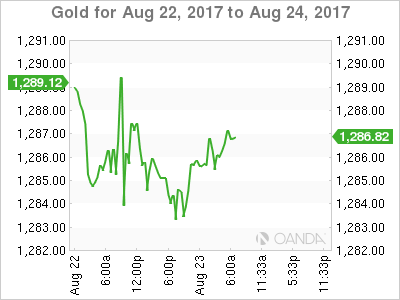
3. Yields back up a tad
In the absence of major economic data, bonds have been strongly influenced by market sentiment in recent sessions, a pattern that is expected to hold for much of this week until the Jackson Hole conference on Friday, which kicks off with a speech from Fed Chairwoman Janet Yellen on financial stability. A key question is whether Yellen will suggest the need for tighter monetary policy to address high asset prices.
While a trimming of expectations for a tighter ECB policy have helped push down yields across the eurozone, investors now seem reluctant to go any further without fresh policy cues.
With market speculation mounting about when the ECB will signal an exit from its ultra-loose monetary policy, Draghi’s speech Friday remains a key focus for markets.
This morning, Eurozone government bond yields have backed up a tad ahead of the U.S open after a plethora of surveys showed the bloc’s manufacturing businesses reported their best month of growth in nearly seven-years.
Germany’s 10-year Bund yield gained +1 bps to +0.41%, while Britain’s 10-year Gilt yield advanced +1 bps to +1.097%.
The yield on 10-year Treasuries increased less than +1 bps to +2.22%.
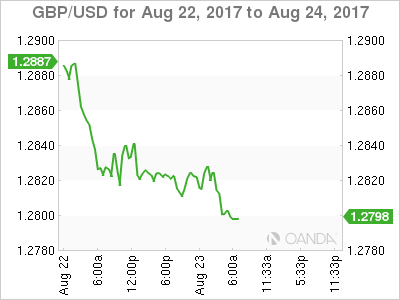
4. Pound struggles on Brexit investment woes
Sterling has fallen further, reaching its lowest reading in two months outright while the EUR/GBP breaks above the psychological €0.92 handle, as investors continue to shun the pound due to Brexit uncertainty.
GBP/USD falls -0.2% to a low of £1.2792, while EUR/GBP rises +0.4% to a high of €0.9215, as the U.K.’s release of policy papers on Brexit this week fails to reassure investors.
Above-forecast Eurozone manufacturing PMI’s have benefitted the ‘single unit’ – the EUR/USD up +0.2% at €1.1787.
USD/JPY (¥109.35) is little changed.
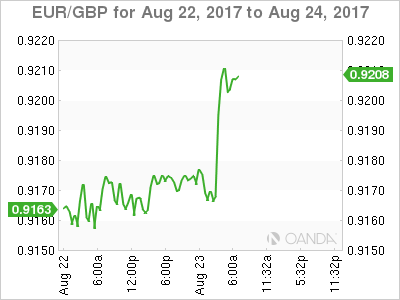
5. Eurozone maintains solid growth in August
Data in Europe this morning showed that eurozone economy maintained its solid growth momentum this month, supported by a rise in manufacturing activity and strong exports, according to the regions PMI reports.
The composite PMI for the eurozone increased marginally to 55.8 from 55.7 in July, which marks a two-month high. The market had been expecting a decline to 55.4.
According to IHS Markit, the outcome signals “strong growth” in the private sector, and the rate of expansion remained broadly “the best seen over the past six years.”
Manufacturing activity picked up in July, boosted by “the fastest rise in exports,” but services-sector activity hit a seven-month low, according to the survey.
